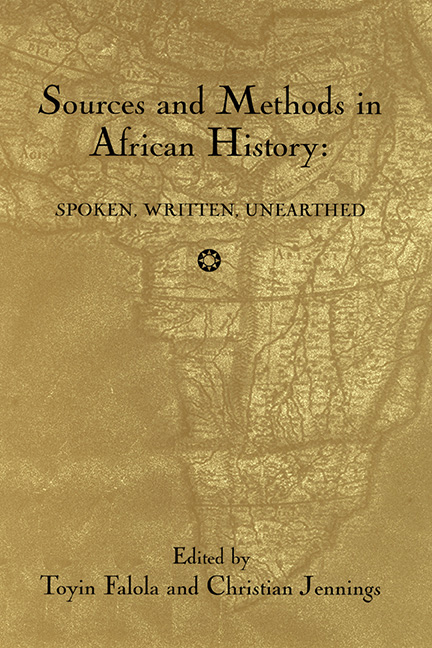Book contents
- Frontmatter
- Dedication
- Contents
- Acknowledgments
- Introduction
- Part I Archaeological Sources
- Part II Africa and the Atlantic World
- 6 Section Introduction: Methodology through the Ethnic Lens: The Study of Atlantic Africa
- 7 Pathways to African Ethnicity in the Americas: African National Associations in Cuba during Slavery
- 8 Slave Trade Nomenclature and African Ethnicities in the Americas: Evidence from Early Eighteenth-Century Costa Rica
- 9 Africa in Louisiana: In Search of “Bambara” and Creole Identities in Literary and Statistical Sources
- Part III Documentary Sources
- Part IV Oral Tradition
- Part V Innovative Sources and Methods
- Contributors
- Index
9 - Africa in Louisiana: In Search of “Bambara” and Creole Identities in Literary and Statistical Sources
from Part II - Africa and the Atlantic World
Published online by Cambridge University Press: 25 October 2017
- Frontmatter
- Dedication
- Contents
- Acknowledgments
- Introduction
- Part I Archaeological Sources
- Part II Africa and the Atlantic World
- 6 Section Introduction: Methodology through the Ethnic Lens: The Study of Atlantic Africa
- 7 Pathways to African Ethnicity in the Americas: African National Associations in Cuba during Slavery
- 8 Slave Trade Nomenclature and African Ethnicities in the Americas: Evidence from Early Eighteenth-Century Costa Rica
- 9 Africa in Louisiana: In Search of “Bambara” and Creole Identities in Literary and Statistical Sources
- Part III Documentary Sources
- Part IV Oral Tradition
- Part V Innovative Sources and Methods
- Contributors
- Index
Summary
Scholarship on slave culture and ethnicities in the United States generally falls into one of two temporal categories: pre- and post-American Revolution. Those studies that emphasize the African-ness of the American slave population usually focus on the seventeenth and eighteenth centuries, before natural increase began to alter the cultural traditions of the enslaved population. Other studies, especially those that emphasize the creolization of enslaved Blacks, are usually centered in the nineteenth century, or at least after the American Revolution. In examining eighteenth- and nineteenth- century Louisiana during this transformative period of slave culture in America, one finds that the experience of slaves in Louisiana did mirror that of other bondspeople in the United States, though important geographic and ethnic diversity within the linear transformation from an “Africanized” to “creolized” slave population warrants close attention. Because of this diversity, the Louisiana example should remind scholars that even within the consensus explanation of how the culture of enslaved blacks in the United States evolved, significant complications particular to time and place exist. In short, I contend that scholars of enslavement must change our thinking and terminology: we must begin to speak of slave cultures, for that pluralized distinction applies not only to the vast variations of Afro-Creole cultures in the New World but even to a geopolitical entity as small as Louisiana.
To outline how I see this approach working best, I have combined two types of diverse sources: slave narratives and slave-trade data. Marshaling the more traditional literary records used by historians of slave culture— the slave narratives—with the data sets used by scholars interested in the slave trade and African ethnicities, forms the documentary foundation of my study. Before the advent of David Eltis's Trans-Atlantic Slave Trade database and Gwendolyn Midlo Hall's Afro-Louisiana History database, scholars lacked evidence to examine how multiple African origins may have created multiple slave cultures in a single location. Pinpointing the origins and destinations of slaves that were imported by Louisiana slaveowners will allow historians to assess with greater precision how the lives, culture, and identities of Louisiana's enslaved population varied within the colony and state. Moreover, these new data sets, coupled with the well-used records of narratives, plantation documents, government sources, and travelers’ accounts create an opportunity to assess how and why specific African ethnicities affected the slave cultures in Louisiana at specific times.
- Type
- Chapter
- Information
- Sources and Methods in African HistorySpoken Written Unearthed, pp. 156 - 166Publisher: Boydell & BrewerPrint publication year: 2003

